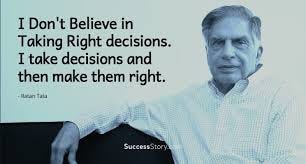The other day at a session for mid-career managers I made the group draw up a list of all decisions on their plate, big or small, and it turned out that most of them didn’t have enormous decisions weighing on them. I was confident of their response because while preparing for the session I had done the same for myself, and it had the effect of a prick to my bubble.
I made a case against trying to get better at decision-making. Instead, I said, we should all get better at reversing decisions.
Months ago, a friend had told me that he believed there’s no such as a bad decision. This guy is a president at an MNC. His main product for the company was decisions. I thought it was too sweeping a statement and I still do. But now I’m more aware of the part in his declaration that is worth retaining and examining.
In the same vein, it occurs to me now, there’s a quote attributed to the late Ratan Tata that exemplifies this thought.
I don’t believe in taking right decisions. I take decisions and then make them right.
While this may pass off as Monday motivation for those who don’t believe in having any method to their decision-making, I don’t believe it is meant to be so by Mr. Tata. Especially not if this quote is apocryphal
Okay, provenance of this quote notwithstanding, there’s a point hidden in it. I say so because stalwarts other than Mr. Tata have belabored the point around decision speed.
The point for you and me is, given the magnitude of decisions we take most days—I categorize decisions by the dimensions of consequence and reversibility—it doesn’t pay us to be trading time to get them right. It makes more sense to optimize for decision speed over decision accuracy. Accuracy is overrated. Getting it right ignores opportunity cost.
The more decisions we take, the more we stand to learn from each turn of the wheel and the better tuned will be our internal machinery. But I’m willing to bet that if people simply took steps to make decisions quicker things would be much worse.
In my experience of having seen a dozen decision-makers from close quarters and several more in conversation as a decision-making trainer, things start turning sour from the point people start introducing urgency to their decision-making. Why is that?
If the first mistake is having no process for decision-making, the second is not having a feedback-collection-and-reflection process to learn from each rep. Both should be avoided, and I suspect the latter is more common. Most corporates are clouded by outcome and hindsight biases. They see everything crystal clear after the outcome has unfolded without asking themselves two important questions:
❓The information that dictated the current outcome, was it available at the time of my decision? This is another way of saying, could i have known that this was going to happen?
❓Did I take a good decision but was unlucky, or the reverse?
As a result of this non-process, they are no better prepared for their next decision. For such practitioners, optimizing for speed in decision-making may not always be helpful because it may reinforce their biases. Sorry, if I’m not selling you a nice, clean picture 🙂
Finally, if there are just a couple of things I could tell young/mid-career people to put them in a position to have more impact in their orgs through their decisions, it would be these:
Instead of trying to get every decision right,
✔️Spend time creating more/better options for decisions on your plate
✔️Rank being swift over being right with your decisions
Maybe I’ll write about creating better options in a later issue. You could let me know if that would be useful to you.
PS: There are also the naturally impulsive trigger-pullers. For them I would suggest, try the 10-10-10 method by Suzy Welch. She says when you’re in a hot state you cannot see beyond the moment. So any way that helps you measure your decision over time is helpful. Her way is simple. Ask yourself, if I make this choice, how would I feel in 10 days? 10 weeks? 10 months? If it’s go-go-go, then go ahead.
PPS: Over time, following a process for not just making decisions but also for learning from them has helped my wife and I improve natural decision-making speed without compromising on accuracy. In recent months, we have made a couple of big house and domestic decisions over the time equivalent of a meal.
👋Hi! I’m Satyajit and thank you for reading my work. Writing is the main medium of creation for me. I also use my skills as a decision-making trainer to help create leverage in my clients’ careers and as a coach to create shifts in perspective in my clients’ lives.




